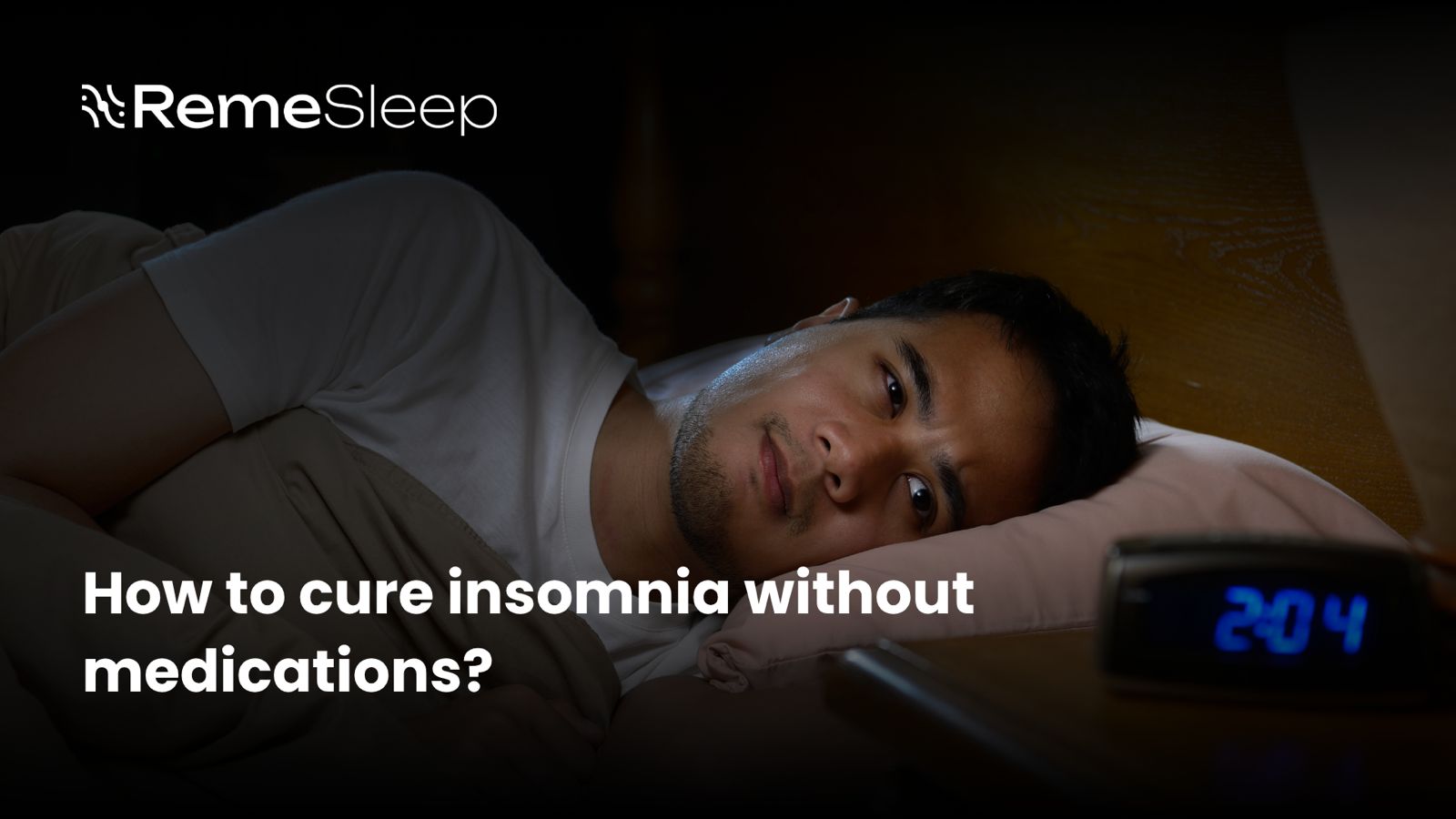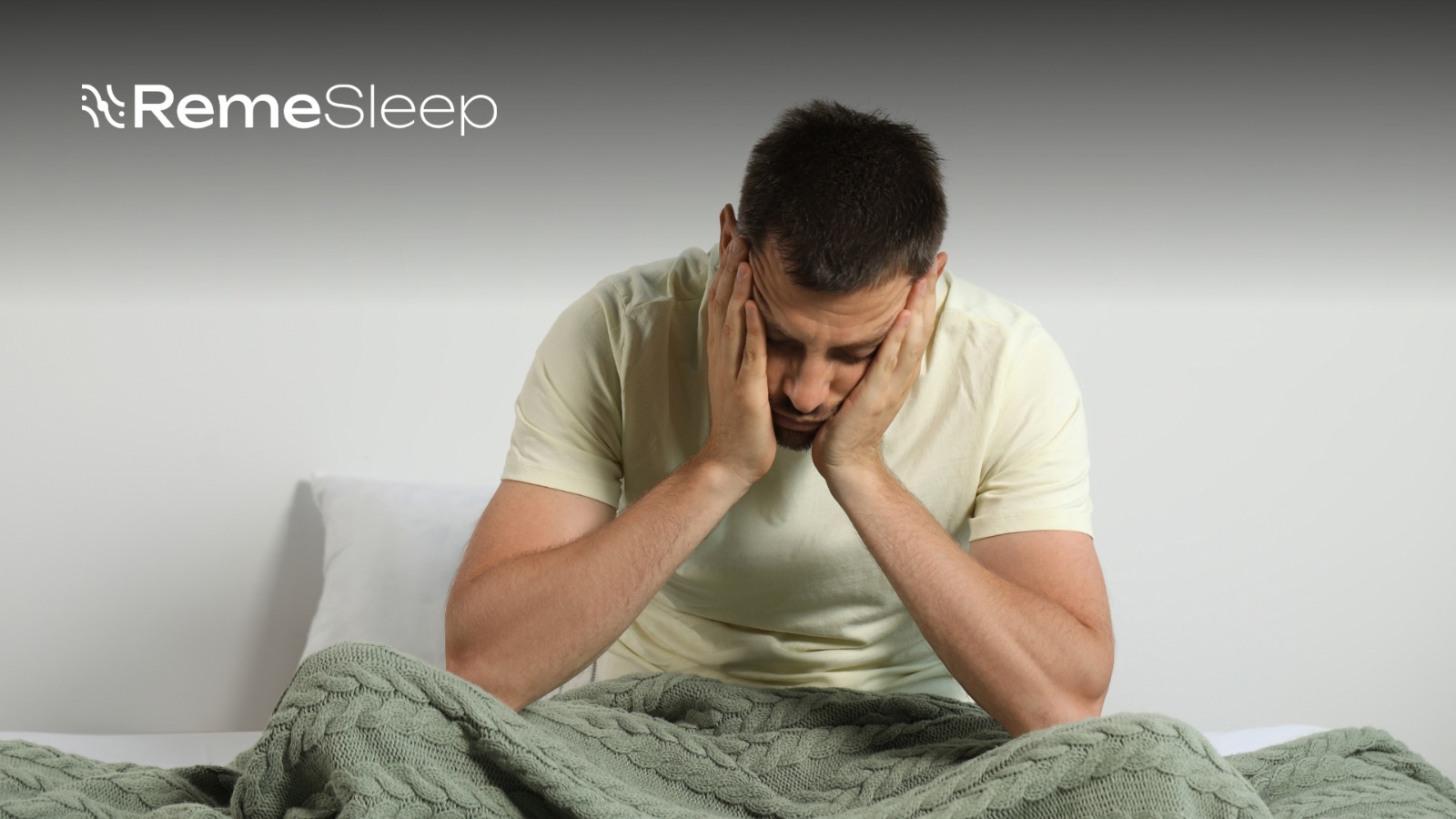Sleep is a basic need, just like air, water, and food. Most adults require 7 to 9 hours of quality sleep each night to support essential body functions and maintain good health. Lack of sleep or sleep deprivation doesn’t just cause tiredness but also increases the risk of serious health issues like heart disease, diabetes, obesity, and a weakened immune system.
Many people face sleep disorders like insomnia, causing trouble falling asleep or staying asleep. Common causes include excess caffeine intake, stress, or underlying medical conditions. Although sleeping pills provide quick relief, they aren’t a sustainable insomnia treatment due to side effects and risk of dependency.
Interventions for insomnia, including behavioral strategies, can improve sleep quality and treat insomnia without medication. In this blog, you will learn about strategies to cure insomnia without medications and establish healthy, restful sleep.
What is insomnia, and how is it different from other sleep problems?
- Insomnia involves difficulty with the quantity or quality of sleep and results in poor daytime functioning.
- It can be triggered by stress, lifestyle changes, certain medical or mental health conditions, or substance use.
- Most adults need 7–9 hours of sleep per night, so persistent trouble feeling rested or energized could indicate insomnia.
Differences from Other Sleep Problems
Insomnia is distinct from other sleep disorders in that it specifically involves persistent trouble initiating or maintaining sleep, rather than other causes of disrupted sleep:
| Condition | How It Differs from Insomnia |
| Obstructive sleep apnea | Involves repeated pauses in breathing, not just trouble falling asleep |
| Restless legs syndrome | Driven by an urge to move the legs at night, which interrupts sleep |
| Narcolepsy | Characterized by sudden daytime sleep attacks, not by inability to sleep |
| Parasomnias | Include unusual behaviors during sleep, like walking or terrors, rather than sleep loss itself |
Negative effects of insomnia
You might hear some people proudly claim they function well on less than six hours of sleep. Nonetheless, in reality, the majority of adults need seven to nine hours of sleep, depending on the individual, for optimal health. Getting insufficient sleep on a frequent basis can lead to sleep deprivation, and this can negatively impact your overall physical and mental health. If you are getting insufficient sleep, you may be experiencing:
- Low energy or constant tiredness (fatigue from insomnia)
- Mood swings or increased irritability (emotional effects of sleep disorders)
- Feeling unusually sleepy during the day (daytime sleepiness symptoms)
- Unexplained weight gain (sleep loss and weight gain connection)
- Difficulty losing weight (poor sleep and metabolism)
- Frequent illness due to a weakened immune system (sleep and immune function)
- Higher blood pressure (insomnia and hypertension)
- Greater risk of heart disease or type 2 diabetes (risks of sleep deprivation)
- Ongoing or worsening body aches (chronic pain and poor sleep)
- Increased stress, anxiety, or depression (mental health and sleeping)
- Poor concentration and mental clarity affect work
- Slower reflexes and decreased coordination
Can insomnia go away without treatment?
Mild or acute insomnia may resolve on its own, especially if caused by temporary stress or environmental changes. However, chronic insomnia usually requires insomnia treatment or cognitive behavioral therapy for insomnia. Studies show only about 14% of chronic insomnia cases improve without help, and relapse is common. The longer and more severe the condition, the less likely it is to go away without proper care. That’s why addressing sleep disorders early is important for long-term relief.
How to fix insomnia with lifestyle changes?
Insomnia can often be improved through simple lifestyle changes focused on sleep hygiene, daily routines, and stress management. If you’re wondering or searching for insomnia treatment without medication, the following strategies can help:
- Stick to a consistent sleep schedule. Go to bed and wake up at the same time every day, even on weekends. This helps regulate your night sleep cycle and reduces sleepless nights.
- Engage in regular physical activity. Exercise improves sleep quality, but avoid it too close to bedtime. It can naturally aid the cure for insomnia without drugs.
- Create a calming sleep environment. Keep your bedroom cool, dark, and quiet ideal for night sleeping. Avoid using your bed for anything other than sleep or intimacy.
- Limit caffeine, alcohol, and nicotine before bed. These are common reasons for sleeplessness and can worsen insomnia symptoms.
- Reduce screen time in the evening. Blue light from devices disrupts melatonin and can be a key reason why I can’t sleep at night. Try reading or meditation instead.
- Avoid heavy meals or excessive liquids before bed. Discomfort or frequent bathroom trips can lead to sleep deprivation and lack of sleep symptoms.
- Practice stress relief techniques like journaling, mindfulness, or gentle yoga to address insomnia causes related to anxiety or racing thoughts.
- Limit naps. If you must nap, keep it short and early in the day to avoid disrupting your night sleep.
These practices are highly effective in addressing mild to moderate insomnia. However, for long-term or chronic sleep problems, insomnia therapy such as Cognitive Behavioral Therapy (CBT-I) is a clinically proven approach. CBT-I addresses both insomnia symptoms and underlying insomnia causes, and is a key part of modern insomnia treatment strategies.
What natural remedies help with Insomnia?
Natural remedies that can help with insomnia include the following:
- Melatonin supplements help regulate the sleep-wake cycle and improve sleep quality.
- Lavender oil (pillow spray or diffuser) promotes calmness and helps you sleep better.
- Chamomile tea or valerian root tea are also options that help you relax and reduce insomnia symptoms.
- Mindfulness meditation and deep breathing techniques help calm the mind and alleviate sleep problems.
- Doing some yoga or other gentle movement helps restore calm and reduce stress, which is a major cause of insomnia.
- Taking magnesium supplements supports muscle relaxation and the desire to sleep at night.
- A cool, dark, quiet sleep environment and a consistent sleep schedule also support the body’s natural circadian rhythms.
- Progressive muscle relaxation helps the body fall asleep faster.
Note: For chronic insomnia, consult a sleep doctor near you before using supplements or combining with other treatments.
When to try CBT for insomnia?
If natural remedies, lifestyle changes, or even sleeping pills and medications haven’t improved your sleep, it’s time to consider Cognitive Behavioral Therapy for Insomnia (CBT-I).
CBT-I is a proven, long-term solution for insomnia, helping address both the underlying causes and symptoms of insomnia without the side effects of medication. If you still can’t sleep, feel sleep-deprived, or suffer from ongoing sleep problems, CBT-I therapy can be the right path to restore healthy sleep naturally.
When to see a sleep specialist near you?
If you’re struggling with insomnia and natural remedies, lifestyle changes, or medications aren’t helping, it’s important to know when to consult a sleep specialist near you. Here are key signs that indicate you should seek professional help for better insomnia treatment:
- Severe daytime fatigue
- No improvement with natural remedies
- Dependence on sleeping pills
- Stress, anxiety, or depression
- Possible sleep disorders (apnea, restless legs)
- Unable to sleep despite good habits
- Frequent night waking
- Poor concentration and memory.
If you recognize these signs and are still struggling to find relief, you might wonder,






